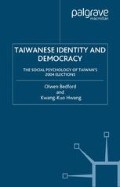Abstract
In mid-April, while the Democratic Progressive Party (DPP) was already efficiently organizing its December campaign, the pan-blue leadership was still wholly mired in forcing an answer to the questions surrounding the March election. The DPP’s continual emphasis on dealing with these questions according to the law was perceived by the pan-blues as a delaying tactic, and the pan-blue leadership had decided their best countermove was to harness the power of the people to force immediate action rather than working within the existing legal system. However, Chen’s remarks regarding the pan-blues’ attempt to mobilize people power were not far off the mark. The pan-blues were not effective in this regard. Even surveys conducted in April by pro-pan-blue newspapers indicated that over 60 percent of the general public opposed the protests. Not only did their popular support wane, but also a number of people within the pan-blue camp lost patience with the top leadership and began to voice their dissent publicly.
As people are walking all the time in the same spot, a path appears.
Lu Xun
Access this chapter
Tax calculation will be finalised at checkout
Purchases are for personal use only
Preview
Unable to display preview. Download preview PDF.
Chapter 9 Identity and Culture
Jewel Huang, “PFP legislators call Ma ‘dumb,’ warn him,” Taipei Times, April 12, 2004, http://www.taipeitimes.comNews/taiwan/archives/2004/04/12/2003136345.
Jewel Huang, “DPP taking KMT to task on ill-gotten assets issue,” Taipei Times, October 25, 2004, http://www.taipeitimes.comNews/taiwan/archives/2004/10/25/2003208331.
Huang Tai-lin, “I am not responsible for what I said, Sisy Chen says,” Taipei Times, April 21, 2004, http://www.taipeitimes.com/News/taiwan/archives/2004/04/21/2003137500.
Huang Tai-lin, “KMT: Should we dump our leaders?” Taipei Times, April 13, 2004, http://www.taipeitimes.comNews/taiwan/archives/2004/04/13/2003151565.
Lin Chieh-yu, “Chen attacks Soong for harping on victim image,” Taipei Times, November 19, 1999, http://www.taipeitimes.comNews/local/archives/1999/11/19/11257.
Jewel Huang, “Murder Chen if he wins election suit, Lien says,” Taipei Times, November 4, 2004, http://www.taipeitimes.comNews/taiwan/archives/2004/11/04/2003209614.
Paul Lin, “Just who can save James Soong?” Taipei Times, April 23, 2004, http://www.taipeitimes.comNews/editorials/archives/2004/04/23/2003137775.
Joseph Bosco, “Taiwan Factions: Guanxi, Patronage, and the State in Local Politics,” Ethnology, 31: 2 (1992), pp. 157–183.
Copyright information
© 2006 Olwen Bedford and Kwang-Kuo Hwang
About this chapter
Cite this chapter
Bedford, O., Hwang, KK. (2006). Identity and Culture. In: Taiwanese Identity and Democracy: The Social Psychology of Taiwan’s 2004 Elections. Palgrave Macmillan, New York. https://doi.org/10.1057/9781403983558_9
Download citation
DOI: https://doi.org/10.1057/9781403983558_9
Publisher Name: Palgrave Macmillan, New York
Print ISBN: 978-1-349-53489-0
Online ISBN: 978-1-4039-8355-8
eBook Packages: Palgrave Political & Intern. Studies CollectionPolitical Science and International Studies (R0)

